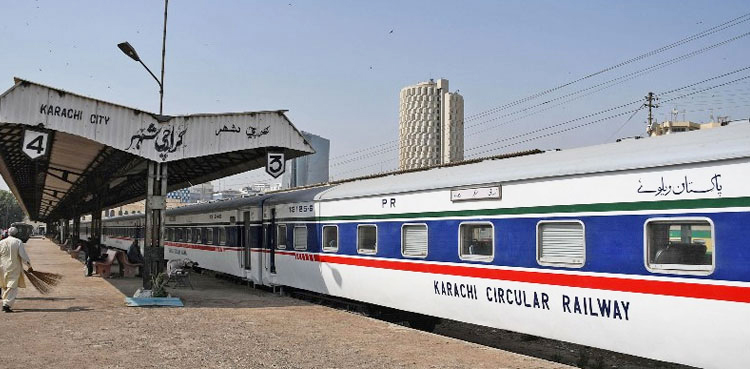The Federal Government approved the Karachi Circular Railway (KCR) project on Wednesday, calling it “excellent news” for Karachiites and predicted it will be “a world-class transit infrastructure” in the making. The KCR will be constructed in three years at a cost of more than Rs200 billion.
The approval of the train plan was a major development for the Pakistan Tehreek-i-Insaf (PTI) government and its leadership, who described it as a “proof of their commitment” to Karachiites and a “justification” for their mandate from the metropolis, while Prime Minister Imran Khan was facing a no-confidence vote filed jointly by opposition parties.
The major project was approved during a meeting of the Executive Committee of the National Economic Council (ECNEC) in Islamabad, which was presided over by Finance Minister Shaukat Tarin.
It approved the development, operation, and maintenance of the KCR as a modern urban railway through a public-private partnership at a cost of Rs201.572 billion.
The cost of the project was amended at the ECNEC meeting after the Central Development Working Party (CDWP) and the Public-Private Partnership Authority (P3A) Board approved it last month at Rs273 billion.
“The project calls for the building of a 43.225-kilometre dual-track urban mass transportation system during a three-year period. The Karachi Circular Railway Management Company (KCRMC) would be in charge of overseeing the project’s implementation, operation, and maintenance, according to a release.
The ECNEC also established a committee led by the finance minister to assess the federal government’s transaction structure for viability gap financing (VGF) contribution. Last year, there was a groundbreaking ceremony.
PM Khan laid the foundation stone for the KCR at the Karachi Cantonment railway station in September 2021. The 44-kilometre KCR would be reconstructed under the revised design, which includes the construction of three underpasses, a flyover, and a 6.4-kilometre elevated structure, as well as the installation of new rail tracks for electric trains over most of the route.
The federal government envisions the KCR’s groundbreaking ceremony and approval by the ECNEC, as well as the commercial introduction of the Green Line bus service in January 2022, as a solution to Karachi’s transportation issue in “one of the best circular railway systems in the world.”
“Great news for the people of Karachi,” Asad Umar, the Federal Minister for Planning and Development, tweeted. “A modern circular railway proposal [for Karachi] has been authorised by the ECNEC.”
In 1999, the service was terminated
The KCR was built in 1964 to assist Pakistan Railways personnel in travelling between their offices (at and around the City and Cantonment train stations) and their homes in Karachi’s eastern neighbourhoods.
In 1970, the service was expanded to a complete circuit of 44 kilometres, connecting Karachi’s four major work centres: the port, the SITE region, the city’s key commercial neighbourhoods such as Saddar, and the Landhi Industrial Area.
The KCR was the preferred mode of transportation for Karachi residents until 1984, when the number of trains was reduced.
The lack of maintenance and repair, a widening gap between expenditures and earnings, increased fuel and operating expenses and income dropping due to subsidised tickets, and the government’s incapacity to spend money on improving tracks and stations were all cited as reasons for the decision.
It forced thousands of daily customers to go by road as the KCR was ultimately shut down in 1999.


